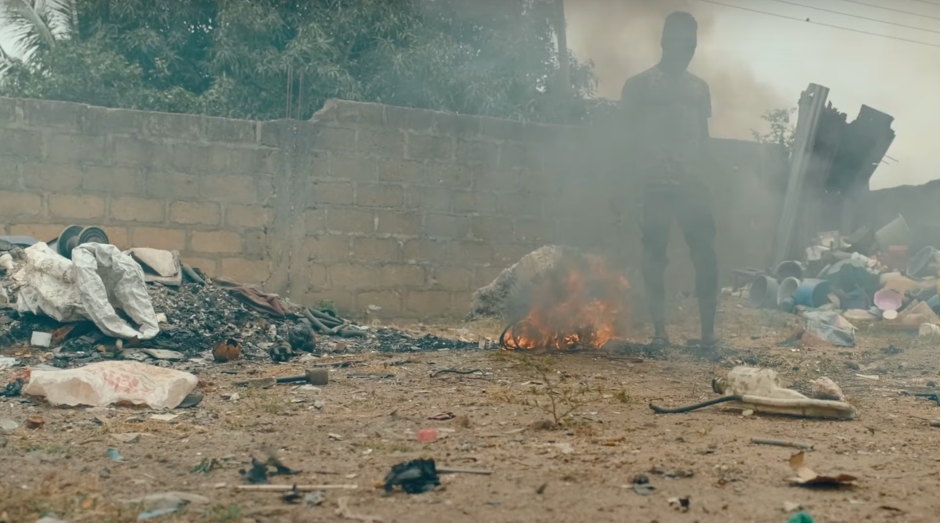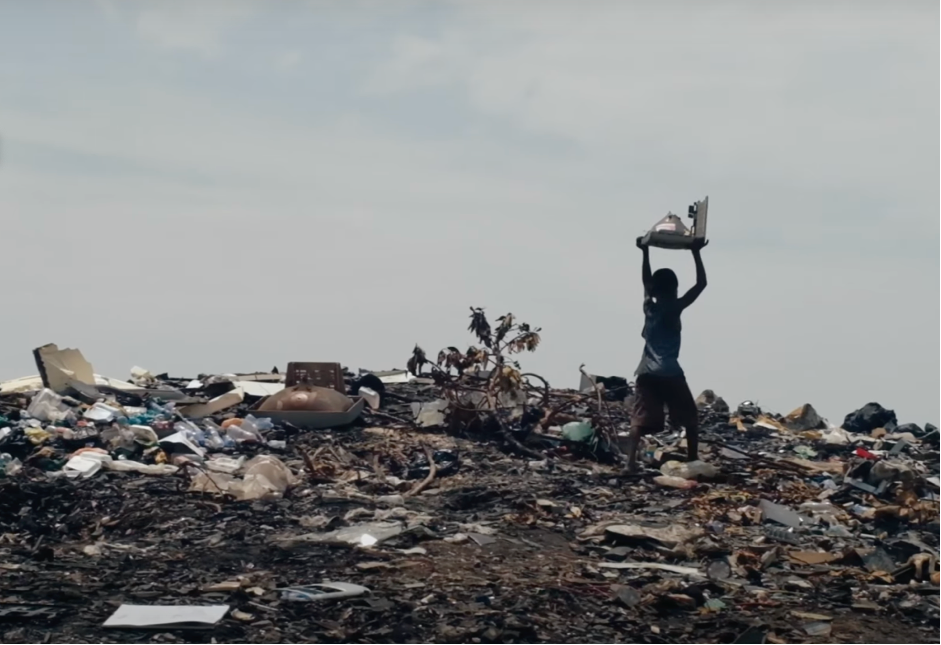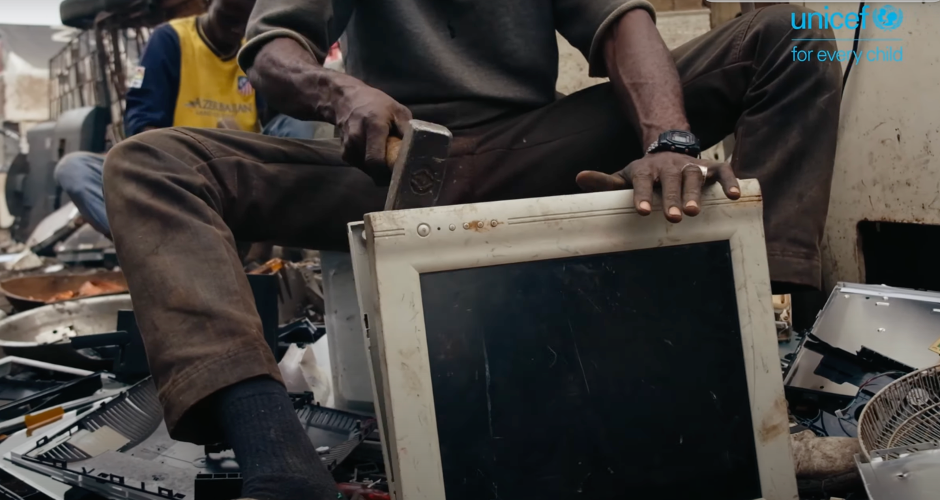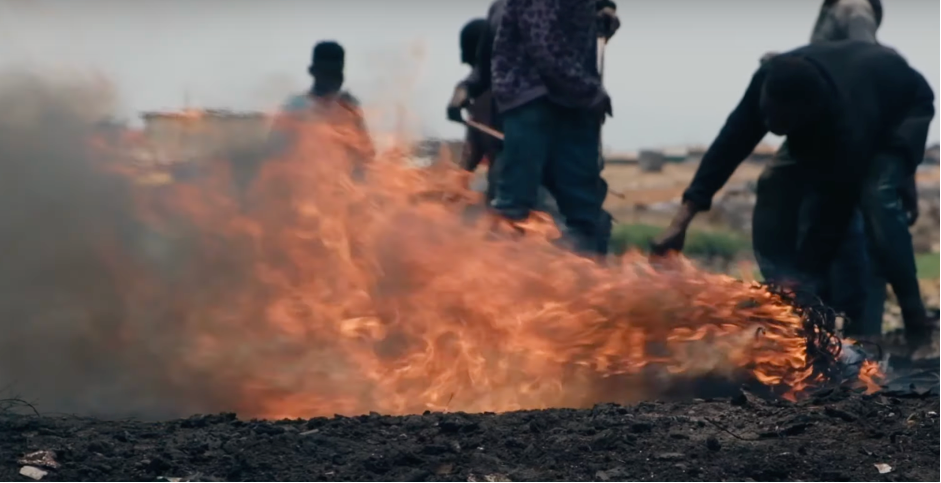
Agbogbloshie (G/A) April 25, GNA- Baby Hawa peers sleepily from the lappa strapping her to her mother’s back. Her mother, Mariama Issahaque, fries yams that she sells to residents and workers here.
One-year-old Hawa looks sickly. Her faint cry is broken up by a weak cough. Mucus drips from her nose.
The smoke from Mariama’s traditional three stone fire mixes with the filthy air – a mixture of tiny particles of sawdust from a wood market, emissions from animals traded here, and airborne chemicals in the smoke from the big dumpsite that has enveloped their neighborhood. Every breath Hawa takes is filled with toxins.
Agbogbloshie is one of the biggest slums and e-waste dumps in Ghana. The large site, on the Korle Lagoon near the centre of Accra, provides the Ghana’s vulnerable with a place to live and trade food, commodities, and electronic waste for income. But oversight by authorities is minimal and experts warn the toxic air is a time bomb, sickening the people here.
Children are among those most vulnerable to air pollution and baby Hawa is paying the price. Mariama, Hawa’s worried single mother, complains of frequent visits to drug shops to buy cold medicines and, when things are bad, to the clinic. Mariama struggles to find the money.
“My child does not fall sick regularly like this when we go to Walewale, capital of North East. We just returned to Accra from holidays, and this has started again,” Mariama says. She knows she should leave for her child’s sake.
“I remember asking the doctor at the clinic why my child frequently is getting sick. But his suggestion for us to leave the area is not within my means. If Allah permits and I get money, I will move. But for now, we have no choice.”

Alex Jagri, an attendant at Servant Drug store, near the makeshift wooden structure where Mariama and Hawa live in an area called Timber Market, sees the impact of the pollution on his neighbours. Flu and cold medications move fast here. He says he sells 35 bottles of cough mixture a week.
“Adults too come here reporting of chest pains,” Jagri says. “I feel bad about the situation, especially when as many as 20 children are brought here coughing and in terrible conditions. I refer the serious ones to the Children’s Hospital. The smoke is too bad and unbearable.”
As Ghana’s economy struggles and the population of Accra grows rapidly, Hawa is one of a growing number of children forced to live in slums and on Ghana’s streets. The slums are on the frontline of air pollution worldwide, according to Cities4Children, a global alliance of organisations working to protect child rights.
The source
One of the biggest sources of air pollution in informal settlements such as Agbogbloshie is solid waste burning. Ghana is fighting to deal with its solid waste. The country generates approximately 7.2 million metric tonnes of municipal solid waste a year, according to data from the Ministry of Sanitation.
For context, that much waste would fill 40-foot shipping containers lined up from Paga, the northernmost town in Ghana’s Upper East, to the southernmost town of Aflao, in the Volta region, more than four times.

Across the nation more than 20 per cent is burnt openly, while 37 per cent is disposed at dump sites. Poor waste management by authorities has compelled informal waste collectors to turn part of the Agbogbloshie slum into a general waste dumpsite that is permanently ablaze spewing smoke across the community day and night.
In the last six months hotspots in Accra have recorded concentrations of the most dangerous air pollution particles several times higher than the World Health Organisation’s (WHO) guidelines recommend.
Agbogbloshie leads the pack with air pollution more than ten times higher than that recommended by the WHO, according to data sourced from Breath Accra, a community driven initiative that provides real-time air quality information.
Health experts in the area are disturbed by what they’re seeing.
“On a daily basis, parents from Agbogbloshie bring their children with cases linked to air pollution,” says Dr Maame Yaa Nyarko, Medical Superintendent at the Children’s Hospital, the only child referral facility in the Central Business District of Accra.
“These include pneumonia as well as allergic respiratory conditions. They often present early but do not have money to pay for services such as admission, x-rays and laboratory investigations.”
Dr Nyarko says respiratory cases are in the top three cases at the out-patient department. They are strongly linked to air pollution, poor ventilation and overcrowding in these communities.
“The danger is that the damage caused to children in slums through air pollution and malnutrition cannot be repaired because, malnutrition leads to impaired immunity as well as irreversible brain damage,” Dr Nyarko says.
“This means they cannot reach their potential in life. They may become adults who are not productive or may have chronic health problems.”

Alarmingly, tests conducted on children living in and around slum areas reveal high blood lead levels, a leading cause of delayed brain development, according to Dr Emmanuel Kyeremateng-Amoah, a health specialist with UNICEF. More than 1.7 million Ghanaian children are estimated to have high blood lead levels.
“Children are not supposed to be at slums because it is dangerous, conditions are unhealthy and unsafe,” Dr Kyeremateng-Amoah says.
He is one of many experts urging the government to tackle the problem urgently. “We have shared our findings with the Ministry of Health, and the Environmental Protection Agency, and are working with the Ministry of Health to manage the children with high blood lead levels.
As a development partner, we are committed to supporting the efforts of government to provide the necessary structures and regulations to make the environment healthier and safer for children.”
The impacts of early exposure to air pollution are clearly documented in studies around the world. A new study by the Harvard T.H. Chan School of Public Health found it increases the risk of developing asthma by early or middle childhood.
A Cities4Children study corroborated Harvard’s findings, adding that children’s exposure to high levels of air pollution can stunt lung growth, and lead to heart disease and increased rates of diabetes in children who would not normally develop these diseases so young.
“With every breath, children take in more air per unit of body weight than adults,” says a 2017 UNICEF report. “By extension, when air is toxic, they take in more toxic air per unit of body weight than adults.”
Awareness is also a problem. While Hawa’s mother, Mariama, is well informed about the dangers of air pollution many more parents are unaware or refuse to believe what the doctors tell them.
At an area called Cable and Wireless, another informal settlement in the heart of Bubuashie and Darkuman communities in Accra’s Okaikwei South, Wendy Adams holds her sickly three-year-old son Nicholas.
Since he was born Nicholas has been suffering a running nose and cough. He is pale, underweight and small for his age. Wendy has taken him to health clinics but she prefers to treat him with traditional medicines given by a local healer.
“I do not believe what the doctors and nurses are saying,” Wendy says. “These are the works of the devil, and we are praying towards his total healing.”
Experts warn that the number of children exposed to dangerous levels of air pollution is growing fast with worrying implications for Ghana’s future.
Ghana’s population has grown, and the slum population has nearly doubled in the three years to 2020, according to Ghana’s 2022 Report on its progress on the United Nations’ Sustainable Development Goals.
Government and local entrepreneurs act
Government and local community members have made efforts to clean up Agbobloshie and more actions are planned.
Two years ago, under the “Let’s Make Accra Work” initiative led by Mr Henry Quartey, then-Greater Accra regional minister, part of Agbobloshie was demolished and fenced. However, it had limited success. The demolition has not stopped activities at Agbobloshie and open burning of e-waste has just spread to other slums.
More than twenty local entrepreneurs have begun initiatives that are recycling the waste, particularly e-waste.
Government plans to run public awareness campaigns, to set up a drop-off point where people can drop off old electronics, and also a program where people can separate plastics to facilitate recycling.
The state also plans to crack down on companies that buy valuable metals from informal scrap dealers.
That will go some way to fixing the problem according to Mr Larry Kotoe, Deputy Director at the Environmental Protection Agency.
While acknowledging weak enforcement and failures in waste management have contributed to the problem, Deputy Director Kotoe says the government is committed to regulation and actions that will slowly transition to a system where importers of electronic appliances will be accountable through an online registry system.
“Our motivation is to get waste disposed properly and reduce air pollution,” says Mr Kotoe.
Experts say there is no time to waste. Until major progress is made in cleaning up the air in slum communities more and more children like Hawa, and Nicolas will pay a major price.
****
This article was a collaboration between Ghana News Agency and New Narratives. Funding was provided by the Clean Air Fund. The funder had no say in the story’s content.
